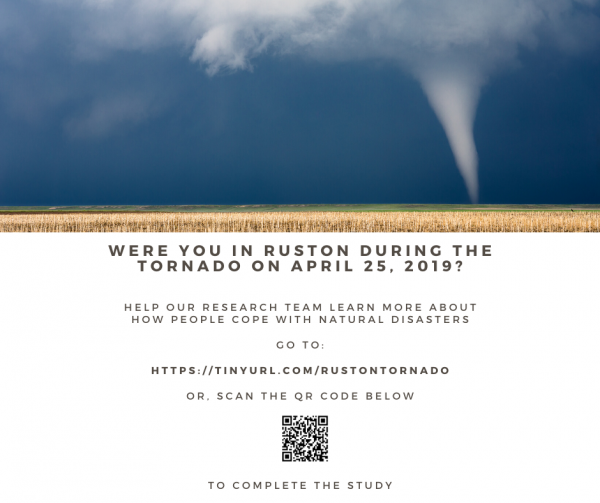Tech students to measure residents’ coping from tornado

Submitted photo
Pictured is a recruitment image used to promote the online survey being conducted by Louisiana Tech faculty and grad students about Ruston residents coping in the aftermath of the April 25 tornado.
While Ruston residents can look around and track the progress of recoveryeffortsfrom this spring’s tornado damage fairly easily, lingering mental and emotional effects from the devastating storm are not as readily noticeable.
That’s why Louisiana Tech University psychology professor Dena Abbott and a group of graduate students are conducting a survey to learn more about how people respond to natural disasters — in this case, the F3 tornado that struck Ruston on April 25.
“The broad intention is to better understand how diverse people cope with natural disasters: what kinds of coping they utilize and what symptoms they experience,” Abbott said.
The survey is online and available to anyone who was in Ruston when the tornado blew through town. One is not required to have sustained any property damage to take part. Participation is estimated to last about 30-45 minutes. The survey can be found at tinyurl.com/rustontornado.
Abbott said the idea for the natural disaster research came from some of her doctoral students training to be counseling psychologists.
After the storm struck, these students, like so many others in the community, lent their aid to mitigate the damage. Afterward, they wondered if there was something more to be done.
“It hit close to home,” Abbott said. “I think they were moved by seeing everybody in the community come together right afterward.
“Counseling psychologists are focused not just on ways we can help people on an individual level, but also ways we can reach out into the community and make sure people are being treated fairly and equitably. So I think that was part of their intention, to want to do something more for their community using their expertise in psychology.”
Abbott, doctoral students Madeline Jones and Caitlin Mercier, and University of Puget Sound experimental psychologists Andrew Franks and Corey Cook collaborated to create the survey and conduct the ongoing research.
Among other topics, the survey will ask participants about their involvement in religion and spirituality, or lack thereof.
“A lot of natural disaster (psychology) literature looks at religious coping, which is one way of coping,” Abbott said. “So one thing we’re interested in is how people on all different sides of the religious spectrum cope in the face of a traumatic natural disaster.”
The research will also attempt to measure post-traumatic growth, or the positive ways in which people grow and change as a result of trauma or difficult events.
“Part of what’s really important to us is to think about the ways in which people utilize their strengths and are naturally adaptive and healthy, so even in the face of really difficult things we can have wonderful outcomes,” Abbott said.
She said she believes research on the Ruston tornado event could prove especially beneficial to the psychology community because most current natural disaster research has been conducted in larger metropolitan areas, such as Houston and New Orleans.
Afterthe storm, some counseling centers offered free or discounted services to residents who may have been affected by the event.
Abbott said a natural disaster is one of the many types of events that can cause post-traumatic stress disorder or similar psychological conditions.
“With PTSD, most people think about military veterans, but there’s all these other kinds of traumatic experiences that many people experience in their lives that can result in PTSD,” she said.
Symptoms associated with post-traumatic stress include anxiety, reexperiencingthetrauma, depressive symptoms and an increased startle response. Any combination of these symptoms can manifest even if a person doesn’t meet the criteria for clinical PTSD.
Rustonites who are struggling mentally or emotionally as a result of the tornado or any other traumatic event are encouraged to seek individual counseling. Two of the many resources in the area are Tech’s Psychological Services Clinic (257-3410) and the Family Counseling Center at the Louisiana Methodist Children’s Home (255-5753).

